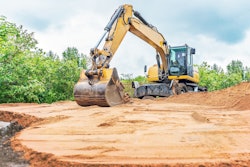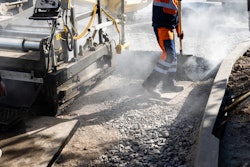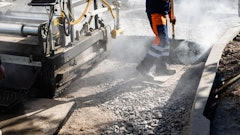
Since 2016, Jon O’Brien has been at the helm of the Keystone Contractors Association (KCA), leading efforts to support Pennsylvania’s construction industry. Over the years, O’Brien has witnessed a transformation in the field—not just in technical advancements, but in the growing need to address issues that affect the well-being of its workforce. Chief among these is the opioid crisis, which has hit the construction sector especially hard. Construction ranks among the highest industries for substance use disorder. O’Brien has been instrumental in raising awareness, fostering open conversations, and equipping companies with resources to tackle this crisis.
O’Brien’s own career is steeped in the construction industry, beginning in 2002 with roles like Certification Manager at SSPC, the Steel Structures Painting Council, and later as Director of Industry Relations at the Master Builders Association of Western PA. When he assumed his role at KCA in 2016, the organization had only 26 members. Since then, under his leadership, membership has grown to over 100 companies, with labor relations extending to over 1,000 construction firms across Pennsylvania.
As the opioid crisis escalated, O’Brien recognized that construction workers were at particularly high risk. The CDC reports that overdose death rates in the construction industry are the highest among over 20 major industry groupings. Overdoses are frequently the result of both on- and off-the-job injuries, chronic pain, and the availability of prescription opioids. In Pennsylvania alone, “construction overdose deaths are more than six times higher than in the general workforce”—a statistic that underscores the urgency of KCA’s work.
“I knew we had to address it,” O’Brien says, and he quickly mobilized a coalition of safety leaders, partnering with construction safety experts like the Master Builders of Western Pennsylvania's Bob McCall and organizations like the National Safety Council (NSC), to curate resources and support networks for employers and employees alike.
Building on these efforts, O’Brien spearheaded the creation of Construction Opioid Awareness Week. What began as a member-exclusive event in 2017 quickly expanded, and by 2018, he had enlisted associations across Pennsylvania, including the Master Builders’ Association, General Building Contractors Association, and several labor unions. With legislative support, Pennsylvania began recognizing Construction Opioid Awareness Week annually, allowing KCA to spread its message across the industry. Today, this initiative continues to destigmatize substance use disorder and encourage open discussions on addiction, helping break the silence that often surrounds the issue.
The impact of these initiatives goes beyond policies and programs; it reaches individuals in powerful ways. In 2018, O’Brien received a call from an electrician in recovery who expressed his gratitude for making it acceptable to talk about addiction, telling O’Brien, “What you’re doing will save lives.” For O’Brien, such feedback highlights the value of these efforts, especially in an industry where discussions around personal struggles have historically been rare.
Alongside in-person initiatives, O’Brien co-hosts the Building Pennsylvania Podcast with Chris Martin from Atlas Marketing, addressing addiction, mental health, and suicide prevention. By amplifying these topics through the podcast, KCA has been able to reach thousands across Pennsylvania and beyond. Among the impactful campaigns KCA has promoted is the NSC’s “Opioids - Warn Me” sticker initiative, which encourages workers to discuss prescriptions with healthcare providers and consider alternatives to opioids where possible.
KCA’s commitment to addressing the opioid crisis was recognized nationally when the organization signed the White House Challenge to Save Lives from Overdoses. This milestone connected KCA with larger national efforts and allowed the construction industry to collaborate with corporations and federal initiatives dedicated to reducing overdose deaths. O’Brien was among the national leaders invited to the White House in the fall of 2024 to recognize leaders and organizations supporting the White House Challenge. O’Brien notes that it felt particularly gratifying to see construction represented alongside organizations like Amazon and Major League Baseball in this mission to save lives.
Also In 2024, KCA hosted a roundtable with the Substance Abuse and Mental Health Services Administration (SAMHSA) and the Opioid Response Network, bringing together construction leaders, mental health advocates, and community stakeholders to discuss targeted solutions for the industry. SAFE Project was invited to participate and this author presented on the opioid risk reduction in Workers Compensation and Employee Benefits focused on the Intersection between substance use disorder and suicide and overdose prevention.
A cornerstone of KCA’s efforts has been making workplaces more recovery-friendly, a goal O’Brien passionately champions. Recovery-friendly workplaces foster a culture that reduces stigma, allowing employees who struggle with substance use to seek help without fear. One way to promote a supportive environment is to provide educational resources about substance use disorder, mental health support, and policies that encourage rather than penalize employees in recovery. SAFE Project’s SAFE Workplaces initiative complements these efforts by offering comprehensive resources—such as training toolkits, stigma reduction programs, and naloxone (Narcan) guidance and training resources—that empower construction companies to protect and support their workforce. The initiative’s naloxone resources guidance, in particular, is crucial: naloxone is a life-saving medication that can reverse opioid overdoses, and the CDC has stressed its importance as a measure to reduce fatalities among high-risk groups. Making naloxone available in workplaces and training staff on its use has proven effective in reducing overdose deaths and can make all the difference in emergencies.
For O’Brien, addressing the opioid crisis isn’t simply about meeting a workplace safety mandate; it’s about creating an environment that supports and protects employees at all levels. His work, along with the support of SAFE Project’s resources, has made it possible for construction companies to not only reduce overdose risks on job sites but to foster a culture of recovery and empathy.
If you or someone you know is struggling with substance use disorder, SAFE Project offers a range of resources through the SAFE Solutions platform, connecting individuals to support groups, treatment providers, and crisis intervention services.
Through these collective efforts, the construction industry is making strides in protecting and empowering its workforce and moving closer to an industry where every worker feels valued, supported, and safe.




















